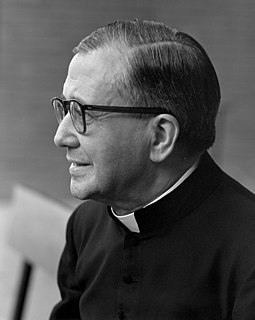A Quote by Thérèse of Lisieux
I know now that true charity consists in bearing all our neighbors'defects--not being surprised at their weakness, but edified at their smallest virtues.
Related Quotes
Our being edified at conference depends on us. It becomes necessary that we prepare our hearts to receive and profit by the suggestions that may be made by the speakers during the progress of the conference, which may be prompted by the Spirit of the Lord. I have thought, and still think, that our being edified does not so much depend upon the speaker as upon ourselves.
It is true to say that for me sanctity consists in being myself and for you sanctity consists of being yourself and that, in the last analysis, your sanctity will never be mine and mine will never be yours, except in the communism of charity and grace. For me to be a saint means to be myself. Therefore the problem of sanctity and salvation is in fact the problem of finding out who I am and of discovering my true self.
As disciples of Christ, we need to feel genuine charity for one another. As we do, new light will come into our own lives. This charity is essential in missionary work, but we must never allow ourselves to treat our neighbors only as potential converts. We have had the sad experience of seeing members of the Church who attempted to convert their neighbors and friends and, when they did not respond, withdrew their friendship and neighborliness. We must not be so anxious to share the gospel that we become insensitive to the feelings of others.
We cannot know the whole truth, which belongs to God alone, but our task nevertheless is to seek to know what is true. And if we offend gravely enough against what we know to be true, as by failing badly enough to deal affectionately and responsibly with our land and our neighbors, truth will retaliate with ugliness, poverty, and disease.
But if the strength ain't real, I recall thinking the very last thing that day, before I finally passed out, then the weakness sure enough is. Weakness is true and real. I used to accuse the kid of faking his weakness. But faking proves the weakness is real. Or you wouldn't be so weak as to fake it. No, you can't ever fake being weak. You can only fake being strong. . .
Humility is the mother of all virtues; purity, charity and obedience. It is in being humble that our love becomes real, devoted and ardent. If you are humble nothing will touch you, neither praise nor disgrace, because you know what you are. If you are blamed you will not be discouraged. If they call you a saint you will not put yourself on a pedestal.
When we want to help the poor, we usually offer them charity. Most often we use charity to avoid recognizing the problem and finding the solution for it. Charity becomes a way to shrug off our responsibility. But charity is no solution to poverty. Charity only perpetuates poverty by taking the initiative away from the poor. Charity allows us to go ahead with our own lives without worrying about the lives of the poor. Charity appeases our consciences.
True generosity consists precisely in fighting to destroy the causes which nourish false charity. False charity constrains the fearful and subdued, the "rejects of life," to extend their trembling hands. True generosity lies in striving so that these hands--whether of individuals or entire peoples--need be extended less and less in supplication, so that more and more they become human hands which work and, working, transform the world.







































